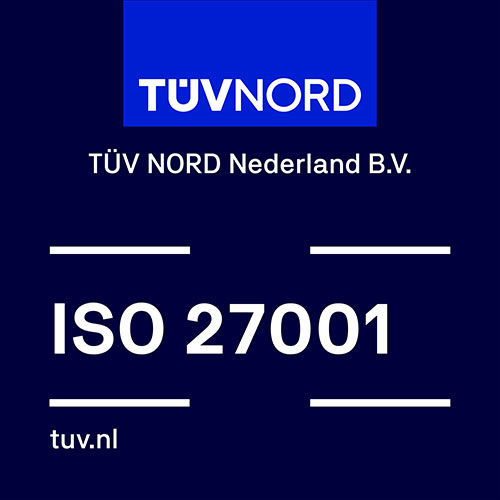Artificial Intelligence (AI) can play a key role in addressing these challenges. In this blog, we explore why AI is essential now and offer five concrete examples of intelligent AI applications that contribute to the quality of care. From faster diagnoses to optimised healthcare logistics, discover how AI can make healthcare delivery more efficient as well as more humane.
Why AI in healthcare is essential now
According to Statistics Netherlands (CBS), 20.5 per cent of the Dutch population was 65+ in 2024, up from just 12.8 per cent in 1990. There are more elderly people needing care, while the number of healthcare professionals is not growing at the same rate. Moreover, care professionals spend much of their time on administrative tasks, which reduces their capacity for direct care provision. The Dutch government has high hopes for generative AI to halve this administrative burden by 2030. AI tools such as automated reporting and voice technology can significantly reduce paperwork. But AI can also be of great value in healthcare processes. McKinsey describes how automating patient trajectories can lead to faster diagnoses and treatments, shorter waiting times and better healthcare outcomes.
At the same time, the increase in digital healthcare solutions is causing medical data to grow exponentially. This makes accurate processing increasingly complex and heightens the risk of errors. AI can help process and analyse these large amounts of data so that healthcare providers can make more informed decisions. For example, PWC describes that AI can analyse mammograms much faster and with higher accuracy than human radiologists, leading to fewer unnecessary biopsies and improved diagnostic accuracy.
AI offers a range of solutions that not only contribute to challenges in healthcare, but at the same time increase the quality of care. Here are five concrete applications of AI in healthcare, showing how we are already helping various healthcare organisations move forward.
5 applications of AI in healthcare
1. Faster and better diagnoses with AI
Qurin develops urine tests that show whether changes can be seen in a person’s genetic cellular material that indicate early-stage cancer. This involves a complex R&D phase to determine which changes indicate an increased risk of cancer. Hundreds of thousands of data points from human cells are analysed to identify these changes. AI was already a proven method for this, but to best set up these processes, they involved Pipple. Our advice allowed Qurin to significantly increase their testing capacity and compare results more easily. With these insights, they are able to make faster progress independently. The mutual discussions were also much appreciated: “They were able to explain the incredibly complicated things they were doing in a simple way.”
2. AI-assisted triage and patient planning
The Jeroen Bosch Hospital (JBZ) is committed to providing care focused on what the individual needs, and we support them with practical AI solutions. One of these cases is determining whether an elderly patient (70+) might have increased vulnerability. Through extensive analysis of both structured data (such as lab values and appointments) and unstructured data (such as texts from doctors), potentially relevant patient characteristics are identified in the electronic patient record. These characteristics serve as input for prediction models that estimate the probability of vulnerability in the patient, based on the available data. The results are then used by care staff to support their decisions and possible referral to a geriatrician. This ensures that patients receive the right care as much as possible and the available care capacity is optimally utilised. As Esther de Vries, data science coordinator at JBZ and associate professor at Tilburg University, says: “A patient is an individual, not an average. Yet it is precisely figures that can make care more personal”
3. Predictive analytics for disease progression and re-admissions
An exceptional situation such as the coronavirus pandemic, where high-speed decisions are made on large amounts of information, emphasises all the more the power of data. As a result of the many questions GGD Hart van Brabant received, they asked Pipple to develop a forecasting model with which they could calculate different scenarios. The basis of the model was RIVM’s reproduction rate. With this, the model predicted how many people were likely to report for a coronavirus test at a later date. Together with healthcare professionals and information experts from GGD GHOR Nederland, Pipple adapted the model so that it could calculate the effects on different parties in the healthcare chain. We continuously expanded the model with relevant variables that GGD GHOR discovered. For example, a large proportion of people returning home from hospital needed extra oxygen. To have sufficient oxygen supply at the right places, that variable was added to the model.
4. Automate administrative tasks
Automation of administrative processes such as medical reporting, claims, patient registrations and appointment scheduling can significantly ease the workload of healthcare professionals. This allows them to spend more time on personalised care for their patients. We have previously researched the use of speech recognition for easy administration of care parameters. This allows healthcare professionals to capture patient information instantly and accurately without time-consuming manual entry at critical moments. At several organisations with diverse help requests, we are implementing chatbots based on generative AI to reduce staff workload. Among other things, well-trained chatbots can answer simple patient questions and manage appointments. And at the Jeroen Bosch Hospital, we help with techniques such as text mining to make better use of free text data from the electronic patient record. In this way, valuable insights can be easily obtained that would otherwise require a lot of manual work.
5. AI in care logistics and resource planning
With almost twelve thousand employees constantly moving from client to client, Tzorg was in need of more efficient travel planning to spend more time on direct care. Analysis showed, among other things, that much information was only in the planners’ heads. Information such as allergies, preferences and level of care, which is essential for matching the right assistance to the client. By capturing data like this and using AI models, Pipple was able to optimise care allocation and travel movements. As a result, employees spend less time in traffic, which increases employee engagement and saves on resources and petrol costs.
AI offers countless opportunities in healthcare. A clear strategy helps identify the biggest challenges and prioritise projects with the most impact, but stand-alone AI solutions can also offer great improvements. At Pipple, we support healthcare organisations with both strategic vision and practical, end-to-end AI solutions that address specific needs. By collaborating with healthcare professionals, we ensure that AI is effectively used to improve healthcare.
Wondering how AI can transform your healthcare institution? We’d love to explore it with you. Send us a message or discover the possibilities during an inspiration session!
Key takeaways
- AI in healthcare offers immediate opportunities for more efficient and humane care delivery
- The combination of data, smart models and human insight is crucial
- Pipple helps healthcare organisations with a sound data strategy and end-to-end AI solutions


